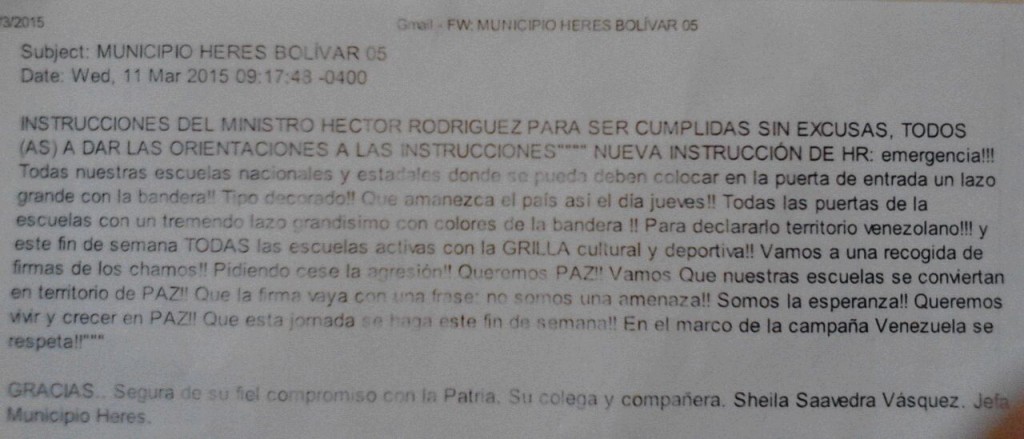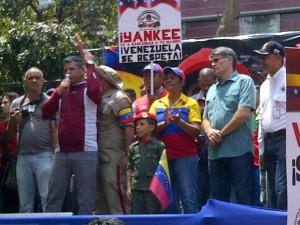
EspañolThe Venezuelan government has sent out memos to schools across the country, requiring that schoolchildren write a letter of protest against US President Barack Obama’s declaration that Venezuela is “national security threat” to the United States.
Venezuela’s Education Ministry issued the orders on March 11 for its regional and municipal offices to celebrate an “anti-imperialist day” in all schools, after Obama’s executive order of March 9. The recommendations were to be followed “without excuses.”
Schools were told to put up a large banner including the Venezuelan flag at their entrance, along with a message rejecting the US announcement, which simultaneously imposed sanctions on several government officials. “We’re not a threat, we’re hope: we want to live and grow in peace,” was the official suggestion.
The central education office also encouraged schools to collect signatures against “US interference.” A national coordinator with Venezuela’s Educational Observatory, Olga Ramos, told the PanAm Post that the directive issued by the Education Ministry did not explain what would be done with the signatures once collected.
The Venezuelan Education Ministry has a a network of supervision offices throughout the country called Education Zones, which in turn are divided in municipalities. Ramos said it was the directors of these municipal offices who contacted schools, in writing or verbally, to comply with the ministry’s request.
The PanAm Post accessed one such memo issued by a municipal school office in Bolívar State:

“The most serious among all these political activities instructed” was the order that every student pen a letter to Obama rejecting the sanctions, said Ramos. She claims the Education Ministry implemented this policy in both public and private schools of at least nine Venezuelan states: Capital District, Miranda, Monagas, Bolívar, Mérida, Yaracuy, Azoátegui, Monadas, Lara, and Zulia.
“By order of the Ministry of Education, turn in tomorrow a letter directed to Obama saying: United States, don’t mess with Venezuela,” reads the assignment sheet sent to six and seven-year-old children in first grade. Venezuelan schools contacted by the PanAm Post declined to comment, claiming they needed authorization to do so.
Government authorities were quick to enjoy photo opportunities with the mandatory demonstrations of anti-US feeling. On March 12, Vice Minister for Educational Communities Soraya El Achkar tweeted photos with preschool children, apparently enthusiastic supporters of Nicolás Maduro in his struggle against imperialism.
Mi Presidente @NicolasMaduro MIRA quienes te acompañan para exigirle a OBAMA cese la agresión y se respete la PATRIA! pic.twitter.com/Si0mxvpnsU
— Soraya El Achkar (@Sorayaachkar) March 13, 2015
“My President, looks who are joining you to demand Obama cease aggression and respect the Fatherland!”
Mi Presidente @NicolasMaduro MIRA quien te acompaña en la defensa de la PAZ!! No somos amenaza, somos ESPERANZA!! pic.twitter.com/2Q6NplDyXF
— Soraya El Achkar (@Sorayaachkar) March 13, 2015
“My President @NicolasMaduro look who joins you to defend peace! We’re not a threat, we’re hope!”
On the same day, the Minister of Education Héctor Rodríguez met with senior high-school students, reporting that they likewise rejected Washington’s “imperialist meddling.”
En la asamblea quedó clara la decisión de la juventud venezolana de rechazar la injerencia imperialista en la Patria pic.twitter.com/Qiom49K3TK
— Héctor Rodríguez C. (@HectoRodriguez) March 12, 2015
“The assembly made clear the youth of Venezuela’s decision to reject imperialist intervention.”
Politics Permeates Schools
Adelba Taffin, a member of Organized Parents of Venezuela and former president of Carabobo’s Bar Association, described the Education Ministry’s actions as a “blatant violation” of Venezuela’s Constitution, national educational statutes, and Article 26 of the Universal Declaration of Human Rights.
“In these norms, parents are expressly given choice over the education we want for our children, and the government here is trying to steer our children into a political act using education as an excuse,” she told the PanAm Post.

Taffin explained that Article 102 of the Venezuelan Constitution declares the state must promote education according to principles of democracy, freedom, equality, justice, and peace, while guaranteeing respect for all schools of thought. The lawyer claimed the measure would instil resentment into children, causing them “anguish and unrest.”
Venezuela’s Organic Law prohibits political activities of any kind within schools. “They’re forcing our children to adopt a political stand that has nothing to do with a formative education,” she said.
Ramos similarly quoted the Organic Law for the Protection of Children and Adolescents (LOPNA), which establishes that children and teenagers should be able develop their own opinions without undue pressure.
Ramos argued that the age of children was not taken into account when assigning homework on complex international political analysis. Students, she suggested, were being asked “to echo the government’s opinion” rather than “analyze what is going on,” and were too young “to express themselves independently.”
Textbook Trouble
Taffin claimed that the “anti-imperialist” letter is not the only recent instance of the politicization of public education. Last week, on the anniversary of former President Hugo Chávez’s death, the Education Ministry imposed a series of official activities in schools.
#asiestamos #noalaeducacionsocialista #noaladoctrinamiento. .. pic.twitter.com/pfJ9IiDaX9
— PadresOrganiza2Vzla (@PadresOrganiza2) March 5, 2015
“#TheSituationNow #NoToSocialistEducation #NoToIndoctrination.”
In 2013, the Venezuelan government similarly distributed free copies of the Bicentennial Collection, a series of government-created textbooks on Venezuelan history, and an illustrated version of the Constitution.
Maduro appears in the latter three times, while his predecessor Chávez features on 12 occasions. Venezuelan independence leader Simón Bolívar is included on eight occasions.
The textbooks offer a version of history in line with Bolivarian Revolution doctrine, and even include some modifications of Venezuelan history.
Translated by Daniel Duarte. Edited by Laurie Blair.
 Versión Español
Versión Español













